Introduction
In the realm of drug development, Exploratory Investigational New Drug (IND) applications serve as a critical gateway for researchers seeking to advance innovative therapies. These applications not only facilitate the initiation of human trials but also play a pivotal role in gathering essential data on drug safety and efficacy.
As the pharmaceutical landscape evolves, understanding the intricacies of Exploratory INDs becomes increasingly vital for stakeholders aiming to navigate the regulatory complexities and accelerate the path to market.
This article delves into the definition, significance, and procedural nuances of Exploratory INDs, highlighting best practices and real-world examples that underscore their impact on clinical research and patient outcomes.
By exploring this essential topic, researchers and industry professionals can better position themselves to harness the potential of Exploratory INDs in shaping the future of medicine.
Understanding Exploratory INDs: Definition and Importance
Exploratory IND applications are submitted to regulatory agencies like the FDA, enabling the examination of new medications in human participants, particularly during early-phase studies. These applications are crucial as they provide researchers with the opportunity to gather preliminary data on pharmacodynamics and pharmacokinetics, which are essential for developing targeted and efficient therapeutic strategies. Our extensive clinical research management services assist this procedure through:
- Feasibility assessments
- Site selection
- Compliance evaluations
- Setup
- Project oversight
- Reporting
ensuring adherence to regulatory standards.
Reporting encompasses thorough updates on study status, inventory management, and documentation of serious and non-serious adverse events, which are essential for ensuring compliance during the research. The significance of exploratory INDs extends beyond initial testing; they can significantly accelerate drug development timelines and enhance patient outcomes. By enabling faster evaluations of drug safety and efficacy in humans, exploratory INDs allow sponsors to enhance their therapeutic strategies early in development.
Pre-IND meetings, which provide valuable feedback for sponsors on product development, play a vital role in preparing comprehensive IND submissions. Furthermore, once the IND is submitted, the sponsor must wait 30 calendar days before starting any clinical trials, establishing a concrete time frame relevant to the IND. Recent updates to FDA regulations for exploratory IND applications, including a focus on providing timely feedback during pre-IND meetings, empower stakeholders to prepare comprehensive IND submissions with greater efficiency.
This proactive engagement not only improves the quality of applications but also fosters innovative treatments that address pressing healthcare needs. Additionally, the process of obtaining import permits and the nationalization of investigational devices is essential to ensure compliance with local regulations. Real-world examples demonstrate how exploratory IND applications have positively influenced patient outcomes, including regulatory guidance from the case titled 'INDs: Exception from Informed Consent Requirements for Emergency Research,' which outlines the implications for conducting emergency research without prior consent.
This demonstrates the critical role of exploratory IND in modern drug development while highlighting how our services can drive global health improvement through innovation and collaboration in the Medtech sector.
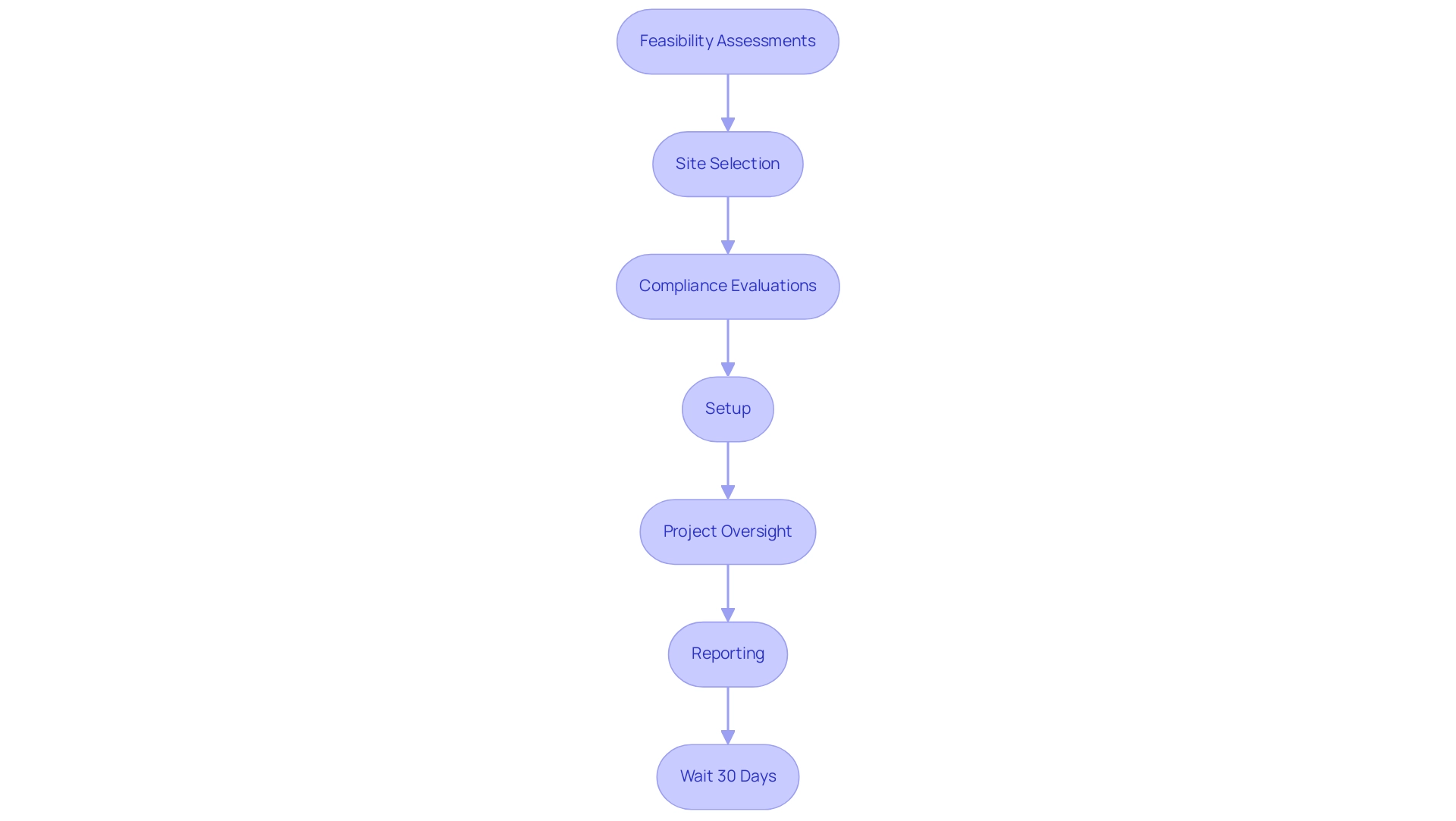
Navigating the Regulatory Landscape for Exploratory IND Applications
Navigating the regulatory landscape for exploratory IND applications necessitates a thorough understanding of the guidelines established by the FDA. Essential components of an IND submission include:
- The investigator's brochure
- Comprehensive preclinical data
- A well-defined clinical trial protocol
Researchers must ensure that their applications align with FDA requirements regarding safety and ethical standards.
This involves meticulous preparation of all documentation, which should be submitted promptly to avoid delays. Engaging with regulatory consultants, such as Ana Criado, Director of Regulatory Affairs and CEO of Mahu Pharma, can provide crucial guidance throughout this complex process, enhancing the likelihood of successful submission. Ana’s extensive experience, coupled with her academic background in biomedical engineering and health economics, positions her as an invaluable resource for navigating these regulations.
Her expertise is further enhanced by the comprehensive service capabilities provided by Mahu Pharma, including:
- Feasibility and selection of research sites
- Principal investigator (PI) selection
- Compliance reviews
- Trial setup
- Project management
- Detailed reporting on project status and adverse events
As emphasized in the case analysis titled 'INDs: Exception from Informed Consent Requirements for Emergency Research,' there are frameworks in place that facilitate compliance in emergency situations. Furthermore, research designs for exploratory IND can include single- and multiple-dose trials, focusing on pharmacokinetic data and pharmacodynamic endpoints.
As the recent guidance document states, 'This can result in more efficient resource utilization and a faster evaluation of a candidate's potential.' By incorporating these elements and leveraging expertise from professionals like Katherine Ruiz, researchers can optimize their submissions and navigate the regulatory landscape more effectively.
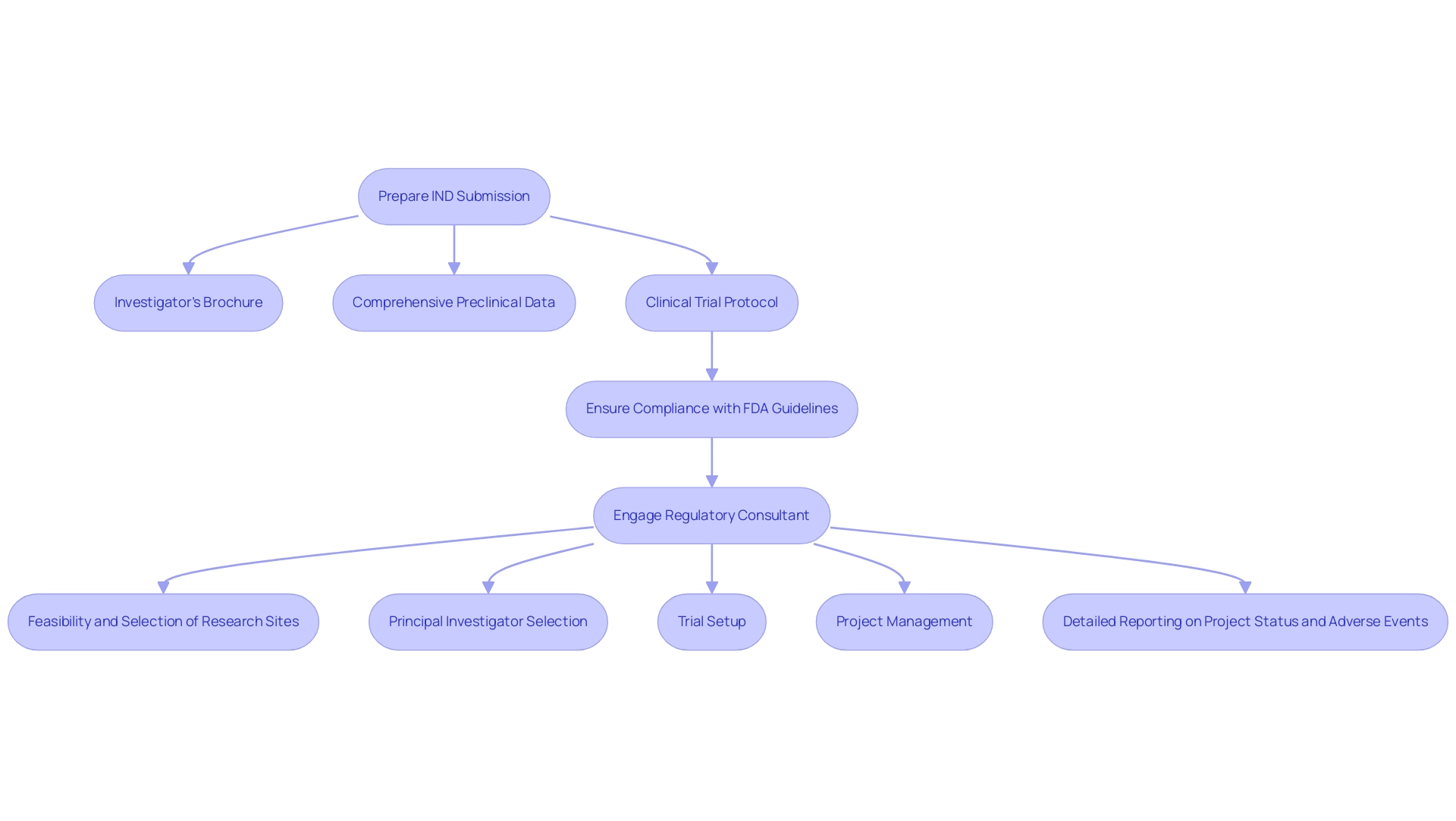
Preparing Your Exploratory IND Submission: Key Steps and Best Practices
Preparing your exploratory IND submission requires meticulous attention to detail and a structured approach. Here are the essential steps to follow:
-
Gather Necessary Documentation: Assemble all required materials, including preclinical study results, the proposed clinical protocol, and informed consent forms.
Ensuring completeness at this stage is crucial, as incomplete submissions can lead to delays. Remember, any presentation materials must be emailed by July 18, 2024, at 11:59 p.m. Eastern Time.
-
Consult Regulatory Guidelines: Acquaint yourself with FDA guidelines for IND submissions to guarantee compliance. Comprehending these regulations will position your submission favorably within the evaluation.
-
Leverage Comprehensive Clinical Trial Management Services: Utilize our expertise in feasibility and selection of research sites and principal investigators, compliance reviews, trial setup, import permits, and reporting to streamline your submission process. Our extensive project management capabilities ensure that all aspects are covered efficiently.
-
Draft the Investigator's Brochure: This document must deliver comprehensive information about the investigational drug, encompassing its pharmacology, toxicology, and intended clinical applications. A well-crafted brochure aids in conveying the drug’s potential to FDA reviewers effectively.
-
Engage Stakeholders: Foster collaboration with your research team and institutional review boards to ensure all aspects of the project are thoroughly addressed. This engagement is vital for aligning objectives and expectations.
-
Review and Revise: Conduct meticulous reviews of all submitted materials to uncover any errors or omissions before submission. This step is essential, as comprehensive documentation significantly reduces the likelihood of common pitfalls encountered in IND submissions. As Nick Chapman, CEO of The FDA Group, notes, "Outsourcing and insourcing models are critical in the current clinical R&D environment, and careful consideration is needed when selecting the right approach for your project."
Furthermore, strategically planning a pre-IND meeting is essential for obtaining feedback from the FDA, as emphasized in the case analysis on best practices for pre-IND meetings. A well-prepared briefing package enhances the effectiveness of these meetings and helps FDA reviewers understand the drug development program. By following these best practices and utilizing our services, including the import permit and nationalization of investigational devices, along with thorough reporting on study status and adverse events, you can improve the overall effectiveness of your IND submission and enable a smoother review.
Katherine Ruiz, an expert in Regulatory Affairs for medical devices and in vitro diagnostics in Colombia, is available to guide you through these processes.
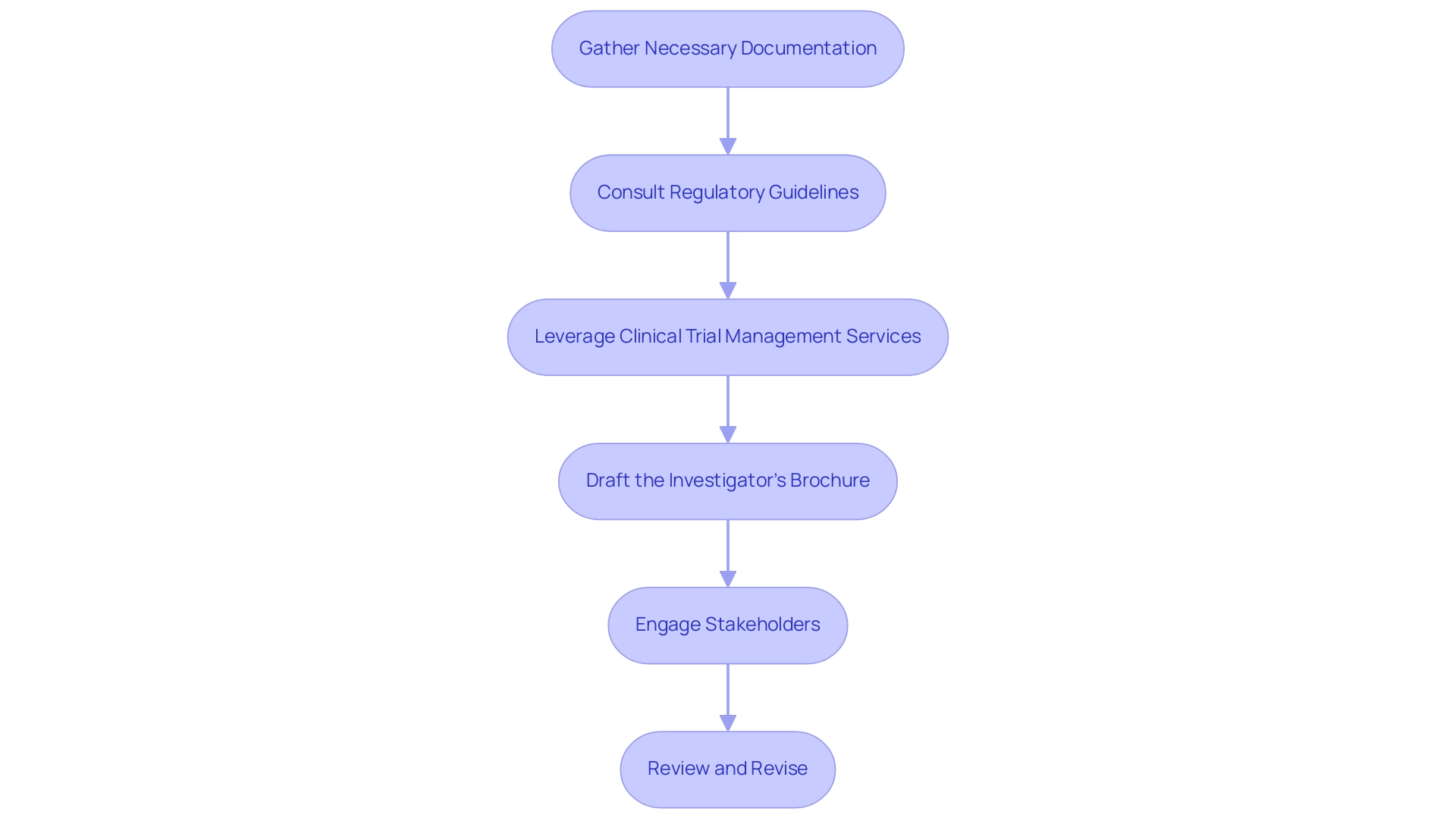
Exploratory INDs in Early-Phase Clinical Trials: The Phase '0' Approach
Exploratory INDs play a crucial role in the framework of Phase '0' clinical studies, which focus on evaluating the pharmacokinetics and pharmacodynamics of investigational drugs in a small group of subjects. This exploratory ind phase is crucial for gathering essential data on the drug's behavior in humans, thereby guiding informed decisions regarding subsequent clinical development. Notably, Phase '0' studies often employ micro-dosing strategies, which involve administering doses significantly lower than those expected to produce a pharmacological effect.
For example, the half-life of the radioisotope utilized in Positron Emission Tomography is 20 minutes, demonstrating the swift pharmacokinetic activities that can be evaluated during these studies. By adhering to stringent safety protocols, researchers can obtain vital insights that not only enhance the efficiency of the drug development process but also substantially reduce the risk to participants. As emphasized by Stadler WM and Ratain MJ, 'Perhaps the most significant and truly clear conclusion from our Phase 0 experience is that these studies cannot be carried out without new molecularly targeted drugs to assess.'
This underscores the importance of drug-discovery efforts in selecting compounds for targeted screening. Moreover, insights from the case analysis titled 'Patient Perspectives on Phase 0 Clinical Research' reveal valuable information regarding patient motivations and concerns, informing future research designs. The implementation of these strategies is crucial in influencing the design of future Phase I studies, ensuring a more customized and effective approach to clinical research.
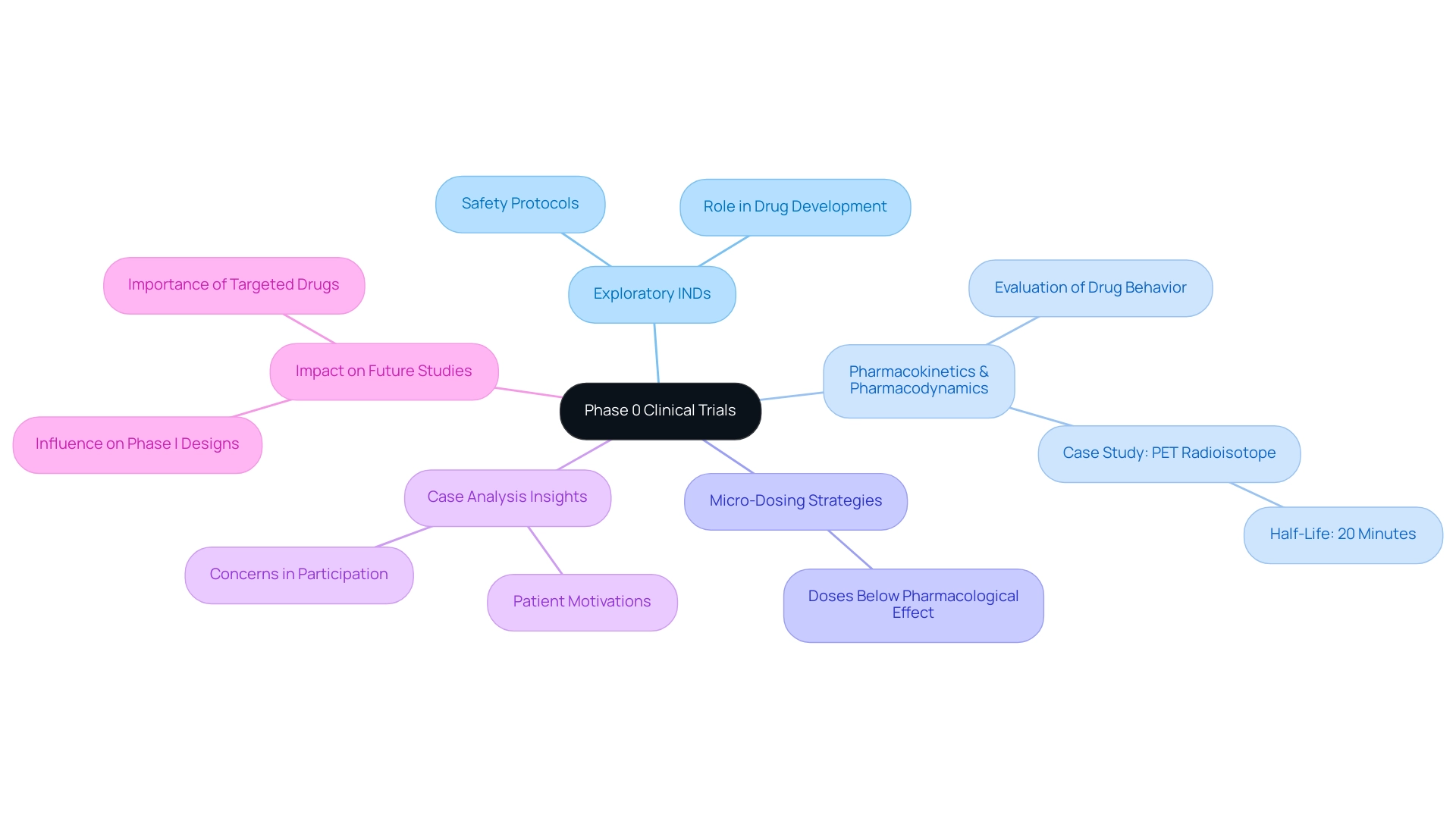
Challenges and Considerations in Conducting Exploratory IND Studies
Conducting research on exploratory IND poses significant challenges, particularly in terms of ethical considerations regarding participant safety and informed consent. Our extensive clinical research management services include:
- Feasibility assessments
- Site selection
- Compliance reviews
- Setup
- Import permits
- Project management
- Reporting
to streamline this process. As emphasized by Britt Hallingberg, This paper presents a systematic review of the existing recommendations and guidance on exploratory research relevant to public health, the necessity for stringent oversight to ensure adherence to regulatory standards cannot be overstated.
Notably, the first phase 0 clinical study of a therapeutic agent in oncology was conducted in 2007, marking a pivotal moment in the evaluation of drug candidates. Moreover, researchers must navigate potential pitfalls such as:
- Underestimating the complexity of data interpretation
- Failing to prepare adequately for unforeseen complications during the research
A recent analysis of the ethics surrounding phase I oncology trials underscores the necessity for ongoing ethical scrutiny and improved communication regarding the risks involved in such research.
This analysis, titled 'Ethics of Phase I Oncology Studies,' illustrates the balance of risks and benefits for participants, emphasizing the importance of transparent communication. Furthermore, the implications of pharmaceutical industry funding on clinical research highlight compliance issues and ethical considerations that must be addressed in exploratory IND investigations. To effectively tackle these challenges, researchers should prioritize:
- Robust planning
- Continuous communication with stakeholders
- Adaptability to evolving circumstances throughout the research lifecycle
By integrating insights from experts like Katherine Ruiz in Regulatory Affairs, particularly regarding INVIMA's oversight role as a Level 4 health authority by PAHO/WHO, and addressing the detailed processes involved in trial setup and the reporting of serious and non-serious adverse events, the quality and integrity of exploratory IND studies can be significantly enhanced.
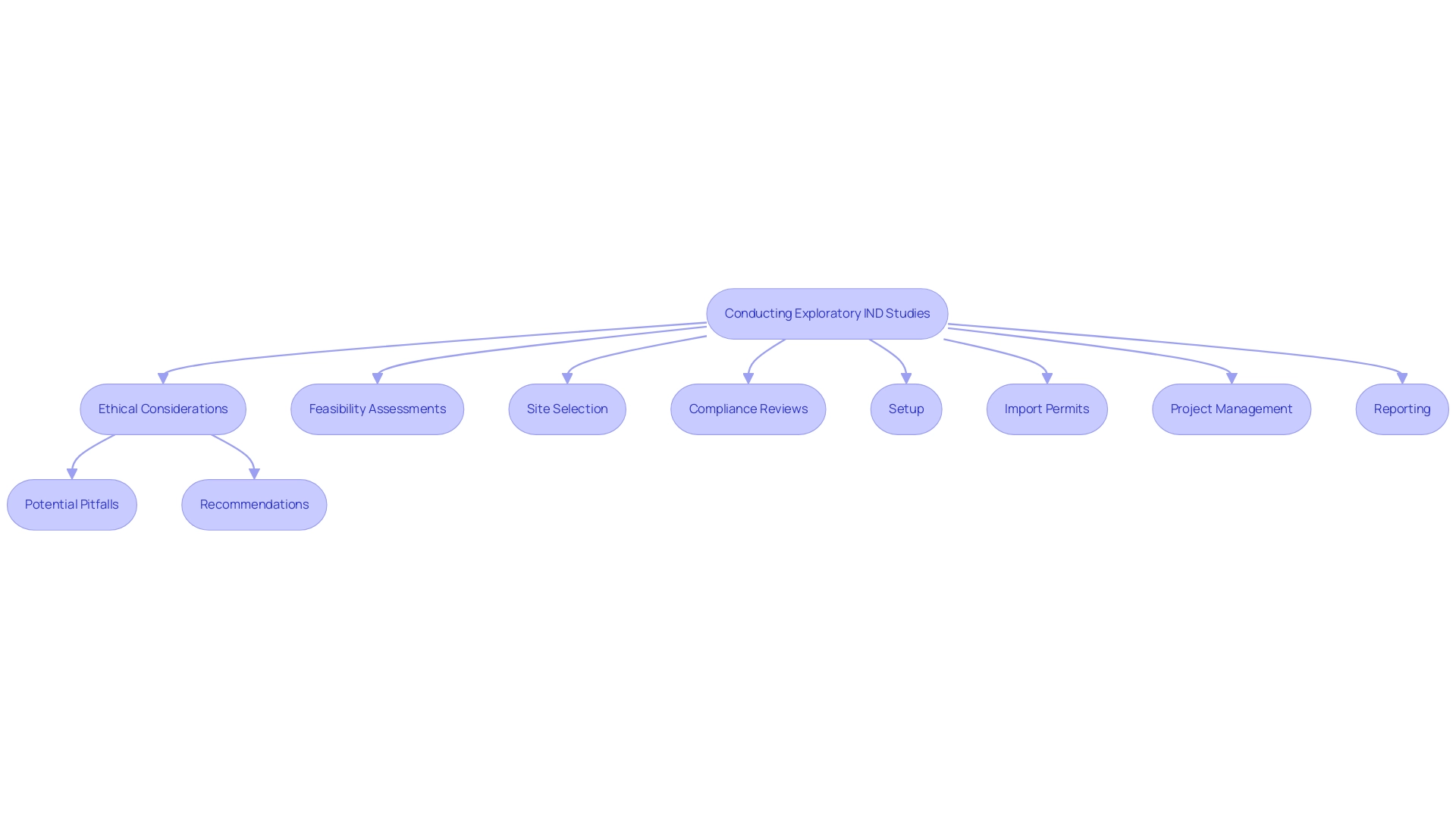
Conclusion
Exploratory Investigational New Drug (IND) applications are pivotal in drug development, serving as a crucial link between preclinical research and human trials. They enable the collection of essential data on pharmacodynamics and pharmacokinetics, which accelerates drug development timelines and improves patient outcomes. Successful IND submissions hinge on effective preparation, regulatory compliance, and strategic stakeholder engagement.
Navigating the regulatory landscape requires a comprehensive understanding of core components, such as:
- The investigator's brochure
- Clinical study protocol
Utilizing clinical trial management services can further streamline the submission process and enhance the exploration of investigational drugs.
Phase '0' trials exemplify the innovative nature of exploratory research, providing early insights into a drug's behavior through micro-dosing strategies while maintaining strict safety protocols. Nevertheless, ethical considerations and challenges must be addressed with ongoing vigilance throughout the study lifecycle.
In conclusion, the strategic use of Exploratory INDs is essential for advancing medical innovation and improving patient care. By embracing best practices and collaborating with experienced professionals, stakeholders can effectively navigate the IND process. This proactive approach is vital for creating a successful pathway to market for innovative therapies that meet critical healthcare needs, ultimately shaping the future of medicine.
Frequently Asked Questions
What is an exploratory IND application?
An exploratory IND application is submitted to regulatory agencies like the FDA to examine new medications in human participants, particularly during early-phase studies. It allows researchers to gather preliminary data on pharmacodynamics and pharmacokinetics.
Why are exploratory IND applications important?
They are crucial for developing targeted and efficient therapeutic strategies, accelerating drug development timelines, and enhancing patient outcomes by enabling faster evaluations of drug safety and efficacy in humans.
What services are provided to assist with exploratory IND applications?
Services include feasibility assessments, site selection, compliance evaluations, setup, project oversight, and reporting to ensure adherence to regulatory standards.
What does the reporting process entail in exploratory IND applications?
Reporting includes thorough updates on study status, inventory management, and documentation of serious and non-serious adverse events, which are essential for ensuring compliance during the research.
What is the significance of pre-IND meetings?
Pre-IND meetings provide valuable feedback for sponsors on product development, helping them prepare comprehensive IND submissions and ensuring timely feedback from the FDA.
What timeline must be observed after submitting an IND application?
Once the IND is submitted, the sponsor must wait 30 calendar days before starting any clinical trials.
What are the essential components of an IND submission?
Essential components include the investigator's brochure, comprehensive preclinical data, and a well-defined clinical trial protocol.
How can researchers ensure their IND applications align with FDA requirements?
Researchers must meticulously prepare all documentation to meet safety and ethical standards and engage with regulatory consultants for guidance throughout the process.
What is the role of regulatory consultants in the IND application process?
Regulatory consultants provide crucial guidance, enhancing the likelihood of successful submission by helping navigate complex regulations.
What types of trial designs can be included in exploratory IND research?
Research designs can include single- and multiple-dose trials, focusing on pharmacokinetic data and pharmacodynamic endpoints.
How do exploratory IND applications impact compliance in emergency research situations?
Frameworks exist that facilitate compliance in emergency situations, as outlined in case analyses such as 'INDs: Exception from Informed Consent Requirements for Emergency Research.'

